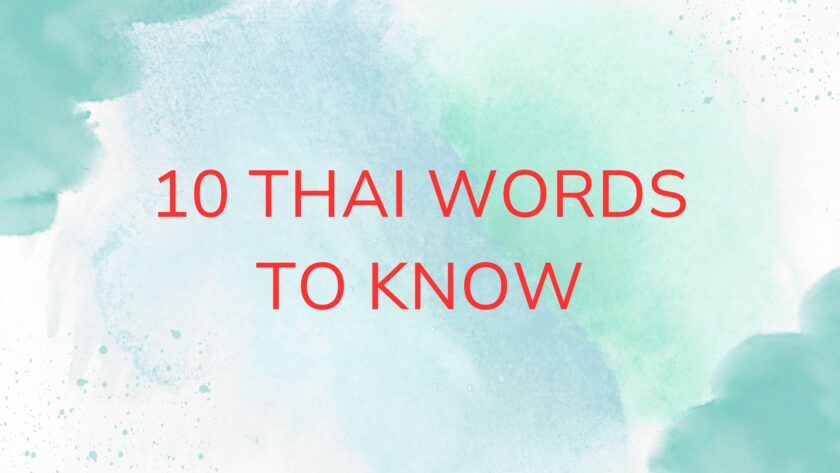Embarking on a Thai adventure is like stepping into a feast for the senses. The vibrant street markets, the aroma of exotic spices, and the laughter of friendly locals create an immersive experience. But what about the language? Fear not, dear reader! In this flavorful guide, we’ll sprinkle 10 useful Thai words into your travel recipe, making your journey not just memorable but utterly delicious.
Unlock a richer Thai experience by learning these essential words for your trip. Beyond convenience, it’s a gesture of gratitude and respect towards the local culture, opening doors to authentic connections. In the vibrant tapestry of Thailand, each word becomes a bridge, fostering understanding and camaraderie. Embrace the language, and let these ten phrases amplify the joy of your adventure.
10 Useful Thai Words: Thai Language Feast
- Hello (สวัสดี – Sawasdee)
- Thank You (ขอบคุณ – Kob khun)
- Sorry (ขอโทษ – Kor toht)
- Excuse Me (ขอโทษ – Kor toht)
- Yes (ใช่ – Chai) / No (ไม่ – Mai)
- Water (น้ำ – Nam)
- No Spicy (ไม่เผ็ด – Mai ped)
- Less Sugar (น้อยน้ำตาล – Noy nam tan)
- Delicious (อร่อย – A-roi)
- Goodbye (ลาก่อน – La korn)
Related Posts:
Before you dive into this short Thai course, take a moment to explore these other valuable blog posts related to your trip to Bangkok:
- Discovering Bangkok Must-See Places That You Can’t-Miss
- Chatuchak Weekend Market Guide: Your Ultimate Shopping Adventure in Bangkok
- Discover Hoenhao Boutique Ratchada: Your Oasis in Bangkok
- Exploring Phi Phi Islands in September: Rainy Season Revelry
1. Hello (สวัสดี – Sawasdee)
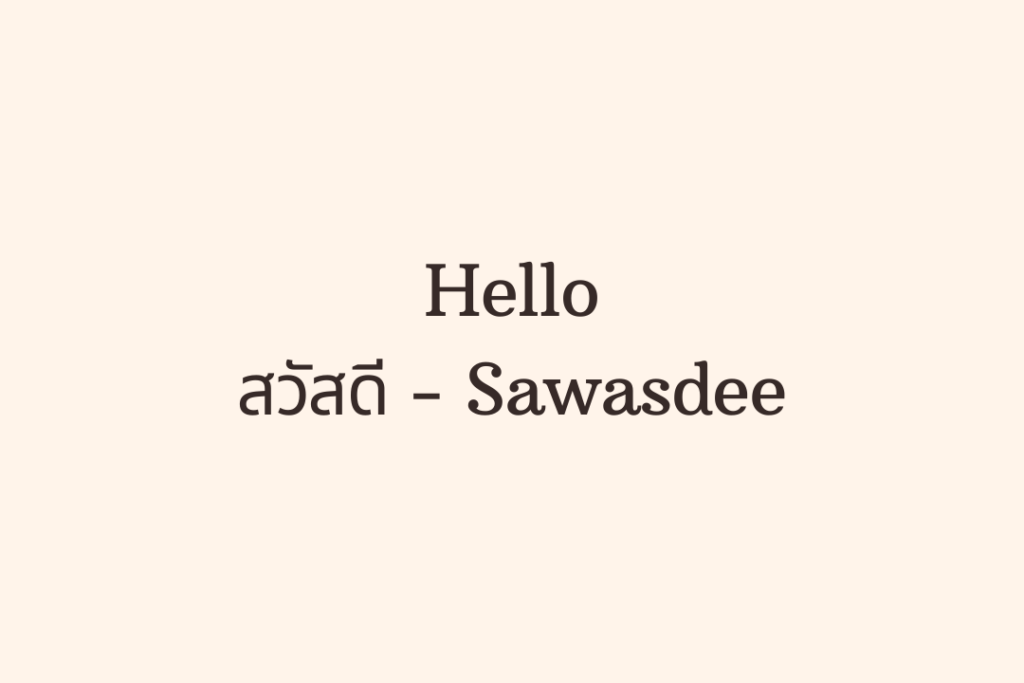
- Used For: Greetings with a Thai Smile
- A warm introduction to Thai hospitality.
- Example: Sawasdee krub (Used by male)/ka (Used by female), the Magic Words
- A touch of politeness goes a long way.
- Pronunciation Tips:
- Pronounce “sawas-dee krub/ka” with a warm smile, emphasizing the first syllable.
- Use Case: Breaking the Ice with Locals
- Tips on initiating friendly conversations.
2. Thank You (ขอบคุณ – Kob khun)
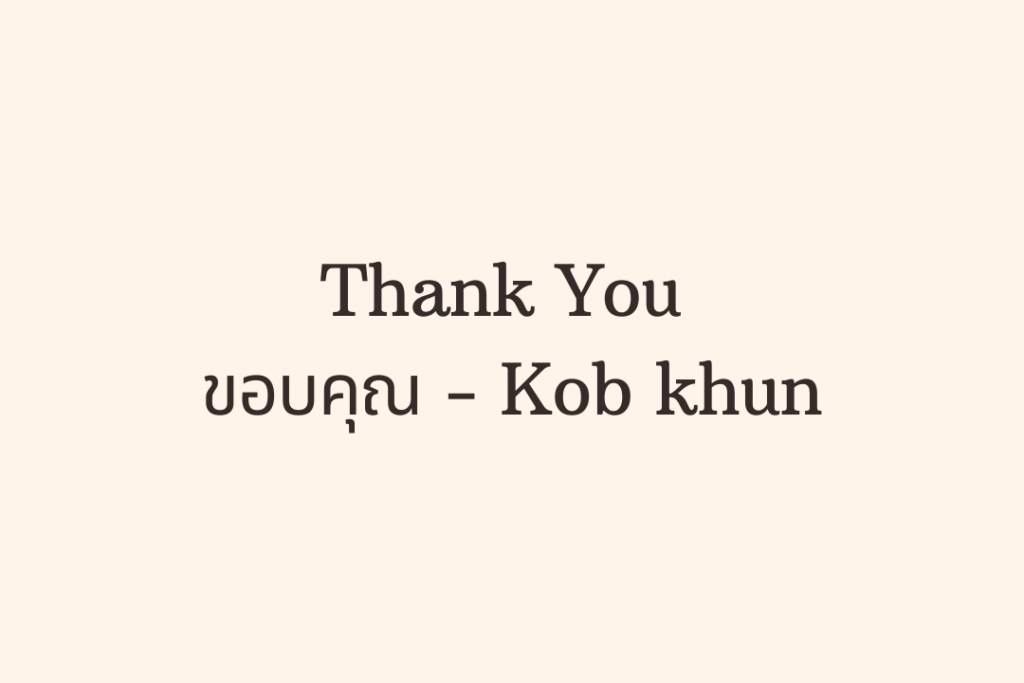
- Used For: Sweetening Interactions with Gratitude
- Expressing thanks enhances cultural connections.
- Example: Kob khun mak, the Extra Grateful Thanks
- Adding a dash of appreciation.
- Pronunciation Tips:
- Add a friendly tone and a slight bow for cultural emphasis.
- Use Case: Gratitude in Every Nook and Cranny
- Where and when to sprinkle your thank-yous.
3. Sorry (ขอโทษ – Kor toht)

- Used For: A Spoonful of Humility
- Apologizing gracefully in the Thai way.
- Example: Kor toht, the Art of Apology
- When and how to use it sincerely.
- Pronunciation Tips:
- Soften the “r” and say it with a genuine tone.
- Use Case: Mending Fences with Kindness
- Handling hiccups with a touch of class.
4. Excuse Me (ขอโทษ – Kor toht)

- Used For: Politeness, the Thai Secret Ingredient
- Navigating through crowds with grace.
- Example: Kor toht, the Magic Word for Attention
- Polite interruptions that work like a charm.
- Pronunciation Tips:
- Use a gentle tone to avoid sounding demanding.
- Use Case: From Markets to Temples – Excusing Yourself Right
- Mastering the art of getting noticed respectfully.
5. Yes (ใช่ – Chai) / No (ไม่ – Mai)
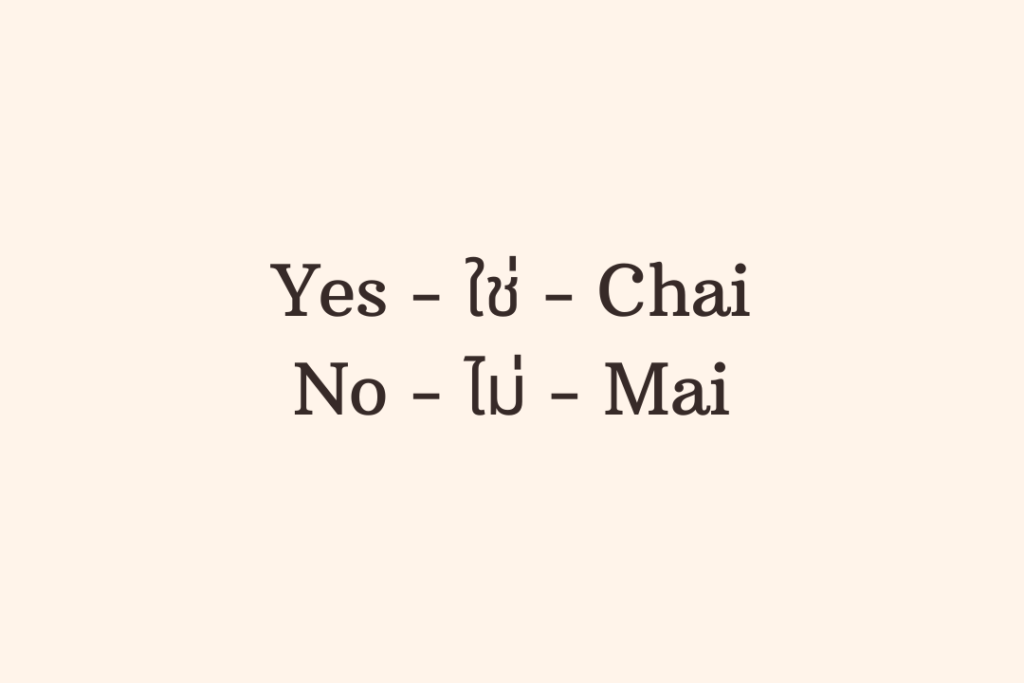
- Used For: The Yin and Yang of Responses
- Nodding or shaking heads, Thai style.
- Example: Chai or Mai? Decoding the Head Movements
- Demystifying the non-verbal nuances.
- Pronunciation Tips:
- Pronounce “chai” with a clear “ch” sound.
- Use Case: Simple Yet Powerful – The Art of Affirmation and Negation
- When to say yes, and when to gently decline.
6. Water (น้ำ – Nam)
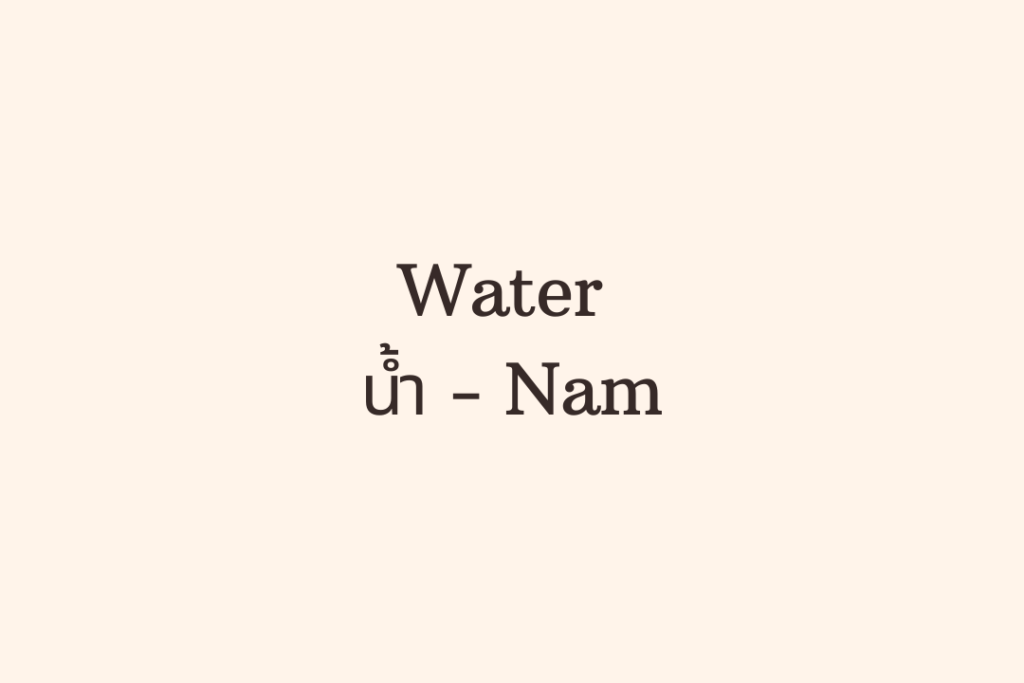
- Used For: Quenching Your Thirst for Understanding
- The elixir of life – ordering water Thai-style.
- Example: Nam yen, the Coolest Way to Stay Hydrated
- Navigating the different water options.
- Pronunciation Tips:
- Pronounce “nam” softly, and add “yen” for cold water.
- Use Case: Staying Fresh in the Thai Heat
- Essential hydration tips for your adventures.
7. No Spicy (ไม่เผ็ด – Mai ped)
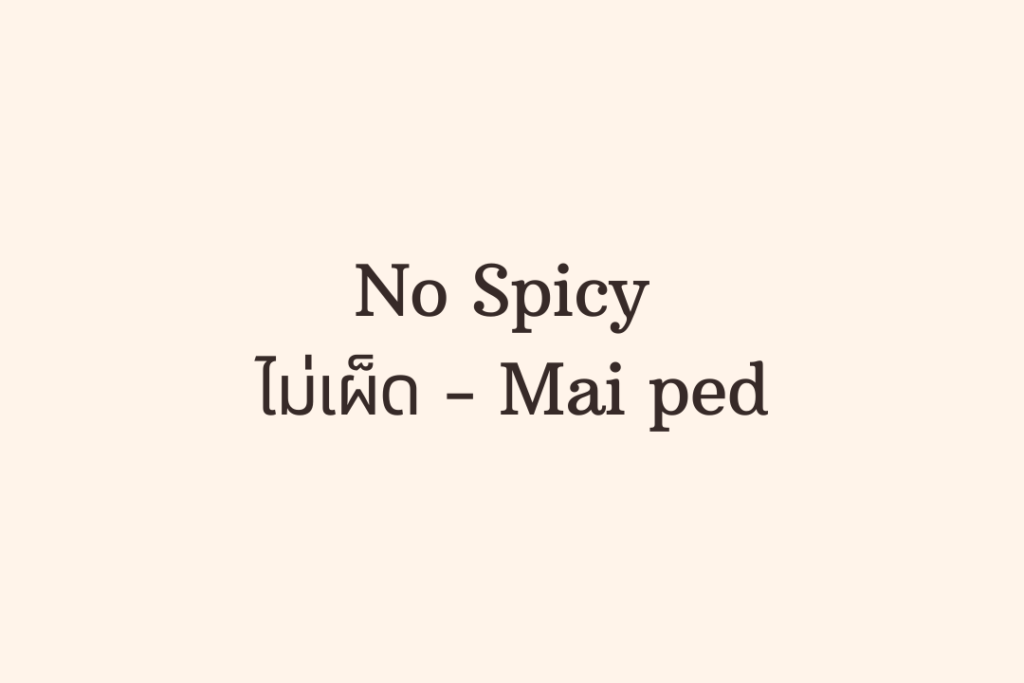
- Used For: Dialing Down the Heat
- How to enjoy Thai cuisine without breaking a sweat.
- Example: Pad kra-pow mai ped, the Spice-Free Delight
- Customizing your meals to suit your taste buds.
- Pronunciation Tips:
- Emphasize “mai” to convey your preference clearly.
- Use Case: Taming the Thai Fire in Your Dish
- Communicating your spice tolerance with finesse.
8. Less Sugar (น้อยน้ำตาล – Noy nam tan)

- Used For: Sweetness on Your Terms
- Satisfying your sweet tooth, just the way you like it.
- Example: Cha yen noy nam tan, the Sugar-Controlled Sip
- Ordering your beverages with a hint of sweetness.
- Pronunciation Tips:
- Pronounce each syllable distinctly.
- Use Case: Navigating the Sweet Spectrum
- How to enjoy Thai desserts without a sugar rush.
9. Delicious (อร่อย – A-roi)
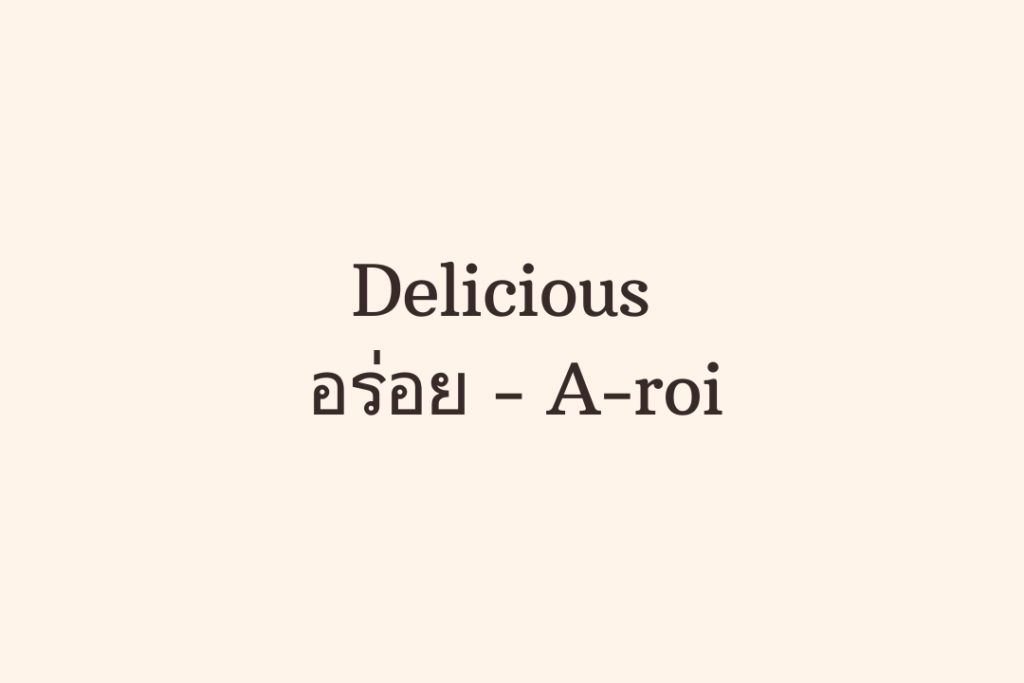
- Used For: Savoring the Flavorful Compliment
- Expressing your culinary delight with gusto.
- Example: Khao pad a-roi mak, the Lip-Smacking Approval
- Celebrating the deliciousness of Thai dishes.
- Pronunciation Tips:
- Pronounce with enthusiasm to convey genuine enjoyment.
- Use Case: Complimenting Your Culinary Hosts
- Building connections through the shared love for food.
10. Goodbye (ลาก่อน – La korn)

- Used For: Farewell with a Touch of Warmth
- Bidding adieu the Thai way.
- Example: La korn, See You Again Soon!
- Leaving with a promise of return.
- Pronunciation Tips:
- Say “la korn” with a gentle tone, embodying a sense of warmth.
- Use Case: Wrapping Up Your Thai Experience with Grace
- Navigating goodbyes with genuine warmth.
A Sprinkle of Thai Magic in Your Journey
With these 10 useful Thai words, you’re now equipped to savor the full spectrum of experiences Thailand has to offer. Whether you’re ordering a meal, expressing gratitude, or bidding farewell, let these linguistic spices enhance the flavors of your adventure. So, go ahead, speak a bit of Thai, and watch as doors open, smiles broaden, and your journey becomes a symphony of delightful connections. Happy travels, and may your Thai adventure be as flavorful as the words you’ve learned! Sawasdee, until we meet again!

